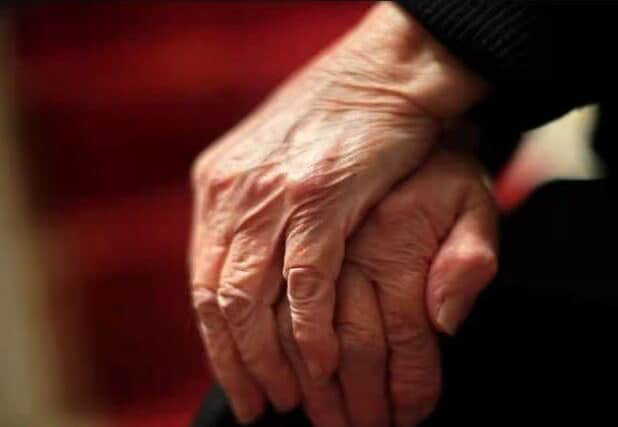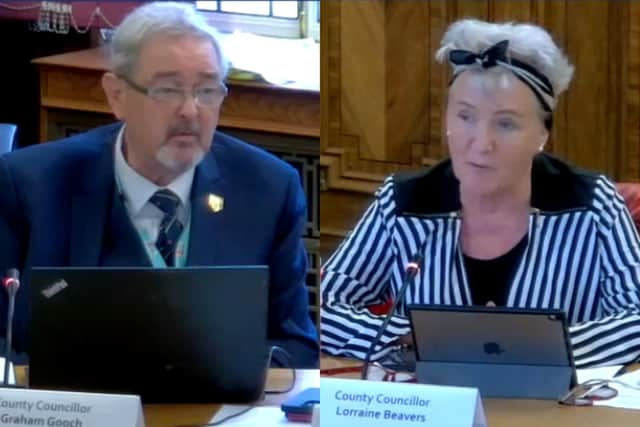'It will deny support to those who can’t pay’: No change to Lancashire telecare charging move
and live on Freeview channel 276
The authority’s cabinet approved the introduction of fees for its telecare facility last month, saying that it could no longer afford to be the only council in the North West to provide the emergency alarm and remote monitoring system for free.
The move was condemned at the time by the opposition Labour group - and seven of the party’s county councillors, along with another from the Green Party, later made an official request for cabinet members to reconsider the matter.
Advertisement
Hide AdAdvertisement
Hide AdKnown as a “call-in”, the procedure would have required the authority either to further justify the reasoning for the charges or, alternatively, to change its mind and abandon the plan altogether.


However, the attempt fell at the first hurdle when the council's cross-party scrutiny management board.declined to refer the matter back to cabinet.
Labour had claimed that the move to charge had breached three of County Hall’s “principles of decision-making” - including by being based on insufficient information and not taking into account the county council’s duties regarding human rights, equality and diversity.
Labour group leader Azhar Ali told the board meeting that the 46 percent of current telecare users who, a public consultation had indicated, would not continue with the service once they had to pay for it equated to 8,300 people “who’ll have a massive impact on ambulances, on GPs, hospitals and, ultimately, social care”.
Advertisement
Hide AdAdvertisement
Hide AdHe said that the financial implications of the decision across the public sector would “come back to haunt us”, before also warning: “We’re going to have people losing their lives prematurely because of our cock-up.”


Under the new policy, the 11,000 Lancashire telecare users who receive no other social care package will, from the new year, have to pay £4 per week for the basic service which alerts a family member or friend to respond to an emergency call. For £5.50, a mobile responder would act in the event of an alarm, while for £9, a user can receive two wellbeing calls or one visit a week.
Those users who already have some other form of social care support will have the cost of telecare incorporated into that wider package and their contribution towards it will be determined on the basis of their ability to pay. However, anyone who signs up in future will face the full weekly fee, irrespective of their other social care needs or financial assessments.
The service - used mostly by the over-65s and many people who live alone - currently costs Lancashire County Council £5.4m a year, a figure which is predicted to rise rapidly. The county council will still be subsidising the £4 basic weekly fee by £2.58 once charges are introduced.
Advertisement
Hide AdAdvertisement
Hide AdTelecare will also have to shift to an entirely new system when the analogue technology on which it currently relies is switched off in three years’ time.
Labour's deputy leader Lorraine Beavers said that the authority had not done its “homework” by failing to carry out a health impact assessment, adding: “This service should not be rolled out to those who can pay and denied to those who can't.”
However, Conservative cabinet member for adult social care Graham Gooch rejected all of the claimed deficiencies in the decision-making process - including a suggestion that the process was too short and badly-timed during the summer holidays.
He told the meeting that the 1,650 responses to the public consultation were within the normal range expected for such surveys and accused County Cllr Ali of supporting the introduction of new technology, but having “no idea…how he would pay for it”.
Advertisement
Hide AdAdvertisement
Hide AdCounty Cllr Gooch said that the authority had received calls from plenty of people who were “so keen to have the service, that they wanted to give their bank details…then and there”.
He also stressed that the existing free service was not “universal” - as the call-in request had claimed - but was dependent on whether an individual met eligible criteria under the Care Act. Research showed that the lack of access to subsidised telecare support for all who wanted it failed to maximise the potential to “reduce expenditure for the state”, County Cllr Gooch argued.
He noted that proof of a breach of human rights legislation would have required evidence of a “real and immediate threat to life”, which he said did not exist in this case - and claimed that the new kit to be introduced when a new contract is entered into in late 2023 would help prevent falls and other health problems, rather than merely reacting to them after the event.
Deborah Gent, senior manager for policy, information and commissioning in the authority’s Live Well service, told the committee that some of those who opted to drop the telecare service would be helped to prepare for a future without it.
Advertisement
Hide AdAdvertisement
Hide Ad“There are much better devices out there that we can gift to those people that don't want to pay for telecare [and who] we do think are really at high risk. We can look at …smart meter technology - there [are] apps such as House [and for] anybody that has wi-fi, we can look to give them an Amazon Alexa, so that instead of a pendant alarm, they can shout ‘help’ and that’ll trigger a response.
“We can support people with that transition to better technology - both for those [who] are willing to pay and want to move onto a really enhanced service, but [also] for those people that want to benefit from some free technology that’s available here and now.”
Ms. Gent also said that while there had been no health impact assessment, an equalities impact assessment had been undertaken, as required by law - and health professionals were also invited to take part in the anonymised consultation.
In response to criticism from the call-in panel that the charging proposal had not been put before Lancashire’s health and wellbeing or integrated care boards, executive director for adult services and health and wellbeing, Louise Taylor, added that the county council had been “working very closely with the NHS on an evidence-based approach to [telecare] and other developments”.
Advertisement
Hide AdAdvertisement
Hide AdHowever, Tory committee member Ged Mirfin cautioned that older people were likely to be "reluctant to use [new] technology until we move beyond the early adopter phase".
Meanwhile, Labour’s shadow health and wellbeing cabinet member, Lizzi Collinge, said that the discussion had served only to reinforce her belief that the charging decision had been reached erroneously - because only age data had been factored into the consultation.
“No other demographic data was collected…[on] protected characteristics [under discrimination legislaation] - therefore, you couldn't weight that data.
“So you could have got a thousand responses from people with a massive house and loads of money or you could have got a thousand responses from people who were poor as church mice,” County Cllr Collinge said.
The committee voted by six to four against asking the cabinet to reconsider its decision.